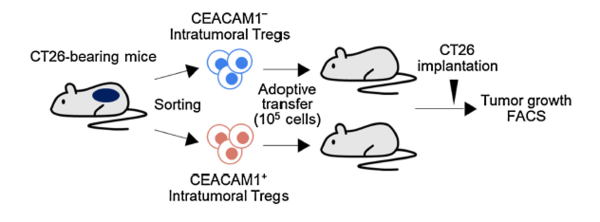A joint research team at KAIST and Samsung Medical Center have found a new target protein, CEACAM1, which can improve immune anticancer therapies through selective removal of T-cells found in tumors.

The study identified a new target protein CEACAM1 that enables the selective removal of regulatory T cells present in the tumor without affecting regulatory T cells and demonstrated that the efficacy of existing immunotherapies, which are widely used in cancer patients, can be significantly increased.
Accordingly, the researchers analyzed tissues and blood obtained from kidney cancer patients in the study.
They found that CEACAM1 is not expressed in regulatory T cells in the blood, but is selectively expressed in regulatory T cells in tumors. They also analyzed single-cell transcription data and confirmed that such a pattern is not limited to kidney cancer but also appears in ovarian cancer.
The researchers observed that when intratumor regulatory T cells expressing CEACAM1 are removed from the immune cells of kidney cancer patients, their ability to remove tumors significantly increases. Additionally, they proved that the anticancer function of immune checkpoint inhibitors significantly increased by removing immune cells expressing CEACAM1.
Consequently, the researchers identified that intratumor regulatory T cells expressing CEACAM1 are the central cells that suppress anti-tumor immune responses, and thus can be useful in the development of more effective chemotherapy and immunotherapy.
Professor Seo Seong-il of Urology at Samsung Medical Center said, "The expression of CEACAM1 is closely related to tumor growth, so it may be applied as a biomarker based on the experiments we conducted on clinical samples."
"The treatment that controls T-cells in tumors is of interest to many researchers, but no treatment has been developed," said Professor Park Su-hyung of KAIST’s Graduate School of Medical Science and Engineering. “We hope that this CEACAM1 discovery will help the development of a therapy to remove tumorous T-cells."
The study was recently published in the Clinical Cancer Research journal.

